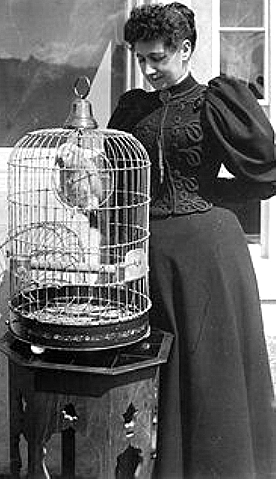
 |
Legacies of 1906 |
||
| April 17 , 2006 |
||
When I was a young girl we had a landlady named Mrs. J. who had, when she was a young girl, survived the 1906 earthquake in San Francisco. She talked about it occasionally, but not much. Maybe nobody asked. Or maybe, like many survivors of trauma, it wasn't something she wanted to talk about. I recently asked my mother what Mrs. J. used to say of those times and Mom said, "I don't remember much—people running, the fires." "Did you ask her about it?" "Maybe. I don't remember. It was a long time ago." I don't remember, either. The one thing I remember was her story of seeing a man running down the street, completely naked, carrying a birdcage with a parrot inside. Oh, how she laughed at that! And still blushed after all those years. The other stories, the darker ones—no, nothing. The questions I wish I'd asked! Now that it's too late, now that this witness to history is gone. Perhaps it wasn't in her nature to dwell on such things. She had such a lovely smile and a jolly laugh, though I don't remember her employing that laugh much. Something sad and solitary always hung about her. Or maybe she just seemed that way to the kid I was. She lived alone in that big house on the front of the lot while we lived in the back house. What ghosts lived with her I can't really say. I can say this: whatever she witnessed back then, it was a defining moment, that one dark thing in the midst of every day—some days large and looming, other days only a small blemish on the face of a perfect rose. Her family lost everything in 1906. I remember her saying that they turned their back on the city because her parents didn't have the heart to start over there. They came south to Los Angeles. I may even have an inheritance from that time, a lovely old chest of drawers she gave me, with a laurel of leaves and a rose carved on the front. An antique guy said it was made circa 1910, so I call it my earthquake chest. I have no illusions it survived the quake, since they did lose everything, but I think it likely part of their new start. When Mrs. J. died, her son who lived in Seattle sold the property to developers and everything from my childhood—those two houses and their yards, my secret combe—are gone, like the living memories of the big quake. Sometimes I imagine myself as a kid again, walking through her immaculate front yard, trailing my hands over the velvet petals of her fragrant roses, walking up those large steps to the porch with the immense white wood pillars—always cool, even on the hottest days. Mrs. J. sits in her favorite white wicker chair with the high back wearing an old-fashioned floral dress and the wide-rimmed black straw hat she always had on outside. She smiles benignly at me. In life, there was always something welcoming and forbidding about her: "Come close, talk to me, but not too close." She'd let me chatter awhile, then the smile faded, and she'd look off into the distance. I knew it was time to go. Only this day, the day of my imagination, it's bright and sunny, oveny hot like a July day. I lean against those cool, white pillars on her porch. She smiles again, and I say to her, finally, "What was it like in 1906? What did you see and smell and hear? What did you think?" On this day, her benign smile never falters, but she shakes her head, just shakes her head slowly and for a long time. Then she looks away into the distance.
|
||
Copyright © 2010 P.J. Thompson |